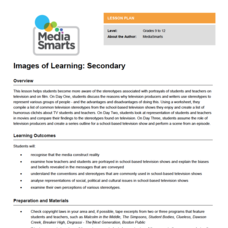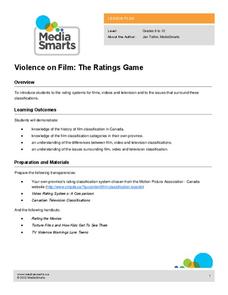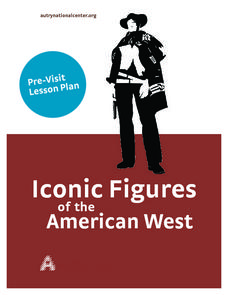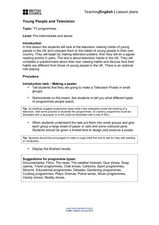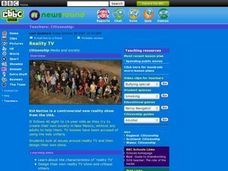Media Smarts
Images of Learning: Secondary
Make your scholars more aware of stereotypical portrayals in film and television. Discuss the definition of "stereotypes" and how they are used to present a story. High schoolers look at specific television shows and complete a chart...
Media Smarts
Thinking About Television and Movies
As part of their study of the influence of TV and films, class members consider how music, lighting, costumes, camera angles, etc. are used to influence the response of viewers.
Media Smarts
Violence on Film: The Ratings Game
Learn about film and TV ratings systems in Canada (includes a comparison to the MPAA system) and how they influence appropriate viewing for youths. A detailed commentary about the film Seven pointed at revealing flaws in ratings systems...
Wctech
Cinematography and Film/Video Production #3
And that's a wrap! This final activity in a series about cinematography and film/video puts class members in full production mode. With over 20 activities, young cinematographers can film, edit, create movies, and organize news...
Media Smarts
Cinema Cops
A study of how public perception is both reflected and influenced by film and television, this instructional activity helps young scholars develop an awareness of audience as well as a critical view of media. Depictions of police in...
Curated OER
Reality Film
Students propose and create documentary films depicting a slice of "ordinary" life that reveals something unique or surprising about its subject. They, in groups, make films and present them to the school.
Curated OER
Understanding: Television
Students discuss their experiences with television. They break into small groups and go through the steps of producing a television show themselves. Their presentations are made to the entire class.
Media Smarts
Teaching TV: Television Techniques
As part of a five-lesson unit on how television uses technology and film techniques to communicate meaning, elementary students create their own media productions that demonstrate their understanding of these concepts.
Curated OER
Diversity in Media: Looking Critically at What We See
This learning experience fosters awareness of representations we see, and don't see, in the media. Learners list TV programs, games, and films they enjoy, identify characters' ethnic, religious, (dis)ability, and sexual orientation...
Curated OER
Television Goes Digital
Students explore the difference between analog and digital televisions. They examine how the technology works and the impact of television through history. They also compare older television sets to ones found today.
Curated OER
Designing And Filming Commercials
Students design and film commercials using digital video cameras and the computer program iMovie in this exciting lesson plan provided by the Florida Center for Instructional Technology.
Curated OER
WWI Through the Film, Foot Soldiers
If your historians are watching the History Channel documentary, Foot Soldiers during their WWI unit, this plan has some simple recall questions and one referential/debate question ("What was the worst part of the war?") to ask after...
Curated OER
Western-Genre Films
High schoolers watch westerns and analyze them. They identify the plot, characters and the sounds in the film. They research icons of the American west and prepare a presentation. They share their presentation with the class.
Curated OER
Young People and Television
Young scholars explore communication by participating in a role playing activity. In this media analysis activity, students answer surveys about their own television watching habits and compare them to the rest of the class. Young...
Media Smarts
Scripting a Crime Drama
Develop novice script-writers. Small groups sift through a sample script, noting any script-writing conventions to share with the whole class. Using these conventions and plot structures, these groups compose a script for a 10-minute...
Curated OER
Film, Book And TV Reviews
In this film, book and TV review worksheet, learners after watching a film, reading a book and viewing a TV show, fill out a form that includes the main characters, plot and story line of each.
Curated OER
Un anuncio comercial
Create your own television advertisement. Have your learners collaborate to create a product and film a tv commercial for it. Consider providing key vocabulary or sentence frames for lower-level learners.
ReadWriteThink
Critical Media Literacy: Commercial Advertising
Commercial advertising—we can't get away from it, but do we realize just how often we are being advertised to? With this instructional activity, scholars analyze mass media to identify how its techniques influence our daily lives....
Curated OER
What Make Good Reality Television?
Students brainstorm what they believe makes a good reality TV show. Students compile a set of attributes that they feel distinguishes the best of the reality TV shows from the others. Using the attributes that the class agrees determine...
Curated OER
General Lesson Plan for Documentary Lens
Use this general lesson guide to inform your instruction surrounding a documentary. The lesson is made up of five activities. The activities are intentionally general because they are designed to adapted for specific films. While the...
Curated OER
Music and Emotion
Students identify the various emotions created by different types of music. They Identify role of music in creating various emotions for film and television . They observe and practice various ways of playing percussion instruments. They...
Media Awareness Network
Images of Learning: Elementary
Tired of 20-somethings portraying high school middle schoolers? Tired of athletes and principals always being the villains? Class members examine the student and teacher stereotypes presented TV shows and films that are et in schools.
Film English
Serial Taxi
Explore the murder mystery genre through film, discussion, and writing. The plan features several activities centered around a two-minute video that include collaboration, writing, and prediction. After the lesson, individuals write...
Film English
Paper Is Not Dead
Now that much of people's lives center around their electronic devices, paper is being used less often. However, sometimes you do need paper. Have your class brainstorm the uses of paper and of electronic devices and compare their...


